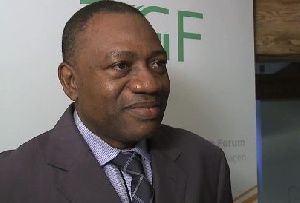Government has introduced a SMEs financing fair, scheduled to take place between 16th and 17th March this year at the Accra international Conference Centre, to help propel the sector’s growth.
The fair, under the auspices of the Ministry of State for Private Sector Development and Public Private Partnerships, will be opened by President John Dramani Mahama.
Themed ‘SME Financing in Ghana -- Enhancing Access and Reducing Costs’, the fair seeks to bring SMEs in touch with banks, government agencies, and Non-Bank Financial Institutions (NBFIs) in order to expose them [SMEs] to innovative financing mechanisms.
Speaking at the fair’s launch, the Minister of State in charge of Public Private Partnership (PPP), Rashid Pelpuo, said that for SMEs to thrive and drive the economy, efforts must be made by both government and the private sector to increase their access to finance, which has become their major obstacle over the years.
“Making the financial sector more efficient and relevant to needs of the private sector is critical to the success of Ghana’s medium-term strategy. This will be achieved by improving the quality of financial intermediation to overcome the market failures that undermine the ability of innovative firms to access credit,” he said.
Government, he said, has rolled-out several interventions over the years to show its commitment to the sector and ensuring that the necessary help is given to SMEs to make the economy export-driven -- hence launch of the fair.
“Government has pioneered various initiatives including setting up various institutions and funds aimed at addressing joblessness through empowering entrepreneurs, the youth and SMEs through the provision of start-up capital and other funding opportunities -- often at concessionary rates. These include but are not limited to the YES, MASLOC, YEA, EDAIF, Venture capital funds etc.,” he said.
The fair, the minister said, will offer SMEs an opportunity to reduce the cost of information asymmetry and its attendant effects, by creating a platform for the bank and non-bank institutions to interact with them.
“The high information asymmetry that leads to lack of awareness on the various funding opportunities and how to access them could also have a direct bearing on the cost of access and hence the low rate of successful utilisation,” he said.
“Information asymmetry could also affect the ability of financial intermediaries to adequately understand the specific and peculiar needs of SMEs to guide product or solution development.”
Figures from the Ministry of Trade and Industry indicates that SMEs make up over 60 percent of private sector business in Ghana and constitute over 90 percent of businesses registered in the country; and are made up of over 160,000 registered limited liability companies and over 350,000 registered sole enterprises.
However, financing has been a major challenge for the sector over the years and this has greatly affected the country as the economy continues to be heavily reliant on imports, thereby affecting the GDP growth.
Even though over 40 percent of the country’s GDP is generated from the Small and Medium-Scale Enterprises (SMEs), the sector is faced with some major challenges which are hampering growth of the economy.
Business News of Saturday, 30 January 2016
Source: B&FT
SMEs financing fair slated for March
Entertainment












